|
|
|
Sort Order |
|
|
|
Items / Page
|
|
|
|
|
|
|
| Srl | Item |
| 1 |
ID:
106265
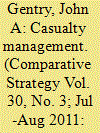

|
|
|
|
|
| Publication |
2011.
|
| Summary/Abstract |
Since World War II, the avoidance, production, and information management of casualties independent of their effects on military forces' combat capabilities have changed political/military operational environments and become major elements of wars' strategies and tactics. Many adversaries of Western states well understand the importance of casualty management. Coherent Western policy and national debates about the strategic consequences of casualties or casualty aversion are lacking, however. This article explores some of the relationships between casualties and military tactics and strategies, domestic and international politics, and operations' outcomes, using the United States as a case study.
|
|
|
|
|
|
|
|
|
|
|
|
|
|
|
|
| 2 |
ID:
101119


|
|
|
|
|
| Publication |
2010.
|
| Summary/Abstract |
The literature on intelligence little describes or comparatively analyzes the intelligence services of insurgent groups. This article partially fills the gap by assessing the intelligence activities of FARC - the Revolutionary Armed Forces of Colombia. FARC intelligence displays similarities to, as well as sharp differences from, the intelligence activities of other insurgent groups and established states. Like FARC as a whole, FARC intelligence is decentralized. Its strength is its focus on tactical military intelligence. Collection on strategic political issues, analysis, and counterintelligence are relatively weak. FARC's intelligence weaknesses limit its prospects for strategic success and its intelligence-related vulnerabilities offer the Colombian government opportunities to exploit.
|
|
|
|
|
|
|
|
|
|
|
|
|
|
|
|
| 3 |
ID:
191887


|
|
|
|
|
| Summary/Abstract |
Proponents of “diversity, equity, and inclusion” (DEI) in intelligence make two basic claims: (1) preferential hiring and promotions for minorities, women, LGBTQ+ people, and disabled persons is good, ethically and politically; and (2) the preferences improve the operational performance of intelligence agencies. This article addresses the second assertion, finds that DEI proponents have failed to provide evidence to support their position, and concludes that preferences for domestically-defined demographic groups cannot improve the performance of foreign-focused intelligence services. Such claims primarily reflect ideological views popular in government and the academy as well as the personal, parochial interests of persons from the favored groups. Instead, the traditional view of the value of diversity remains accurate: capable individual persons with different skills from all major demographic groups are primary drivers of excellent intelligence performance.
|
|
|
|
|
|
|
|
|
|
|
|
|
|
|
|
| 4 |
ID:
179153


|
|
|
|
|
| Summary/Abstract |
For centuries, the roles of diplomat and spy were closely linked. Ambassadors gathered information in many ways. Some were overt, others clandestine. The diplomats of 15th-century Venice and Russia, for example, are renowned as being especially effective intelligence collectors.1 Over time, however, the professions of diplomacy and espionage diverged, and intelligence officers and diplomats understood the distinctions even when they interacted closely. Yet, even with foreign ministries firmly established in essentially all states, meaning professional diplomats are readily available, national political leaders recurrently choose to use intelligence officers for diplomatic purposes.
|
|
|
|
|
|
|
|
|
|
|
|
|
|
|
|
| 5 |
ID:
160705


|
|
|
|
|
| Summary/Abstract |
Collection of important information is a critical part of the intelligence business. Less recognized and studied is the differential use of types of intelligence information based on personal and organizational preferences for, and biases against, specific intelligence collection disciplines, or ‘INTs’. This article presents a framework for assessing the implications of ‘favorite INTs’ for policy-making, policy implementation, and intelligence analysis. The record shows that favorite INTs negatively influence analysts and the use of intelligence by senior political leaders and military commanders. Practitioners can improve intelligence support and scholars can better understand how intelligence influences decision-making by appreciating how and why favorite INTs develop and influence decision-makers and analysts.
|
|
|
|
|
|
|
|
|
|
|
|
|
|
|
|
| 6 |
ID:
140990


|
|
|
|
|
| Summary/Abstract |
The Intelligence Reform and Terrorism Prevention Act of 2004 (IRTPA) created a Director of National Intelligence (DNI) and ordered him and his Office of the Director of National Intelligence (ODNI) to improve intelligence analysis in the wake of two major perceived U.S. intelligence failures: al-Qaeda's attacks of 11 September 2001 (9/11) and the National Intelligence Estimate (NIE) on Iraqi weapons of mass destruction (WMD) of September 2002.1 Observers’ initial assessments of the IRTPA were generally that the DNI and his office would be weak and have little effect on the U.S. Intelligence Community (IC) other than adding a wasteful layer of bureaucracy.
|
|
|
|
|
|
|
|
|
|
|
|
|
|
|
|
| 7 |
ID:
173958


|
|
|
|
|
| Summary/Abstract |
On 5 August 2016, former Deputy Director of the Central Intelligence Agency (CIA) Michael Morell, in an op-ed in the New York Times, endorsed Hillary Clinton for president of the United States over Donald J. Trump, citing his career as an intelligence officer as authority for his action:
|
|
|
|
|
|
|
|
|
|
|
|
|
|
|
|
| 8 |
ID:
164610


|
|
|
|
|
| Summary/Abstract |
States and non-state actors increasingly use norms instrumentally as integral parts of strategies to help win wars by exploiting political vulnerabilities produced by other actors' adherence to the norms. Actors especially manipulate reactions to violations of casualty-aversion norms to entice or prevent external interventions in conflicts. States have few defenses against the instrumental manipulation of norms they hold dear, and seem largely oblivious to their normative vulnerabilities. High success rates and the continuing proliferation of human rights mean new types of instrumental uses of norms for new purposes are likely to emerge, posing major practical challenges to policymakers, military personnel, and intelligence services, and theoretical challenges for scholars.
|
|
|
|
|
|
|
|
|
|
|
|
|
|
|
|
| 9 |
ID:
169008


|
|
|
|
|
| Summary/Abstract |
The role of intelligence in determining outcomes of battles and wars has varied dramatically across conflicts and time, contributing to wide differences in judgments about the importance of intelligence in war. Some analysts minimize the importance of intelligence while others argue it is essential. Opposing perspectives often do not engage each other’s points and generalize from small samples of conflicts. The result is a disjointed discussion of the roles and importance of intelligence in armed conflicts. This article’s aim is to partially rectify this situation by deriving an analytic framework that links intelligence to military operations and strategic outcomes.
|
|
|
|
|
|
|
|
|
|
|
|
|
|
|
|
| 10 |
ID:
094453
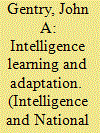

|
|
|
|
|
| Publication |
2010.
|
| Summary/Abstract |
Critics of US intelligence focus extensively on the alleged inability and unwillingness of intelligence agencies to learn and adapt. Analysis of eight counterinsurgency wars suggests instead that external factors largely influence the intelligence-related performance of whole governments, including organizational structures, unity of effort and command, adequacy of resources, and leadership quality. Assessment of the performance of US intelligence since 9/11 indicates that the same variables influence the performance of US intelligence, suggesting that the US intelligence reform debate focuses too narrowly and on the wrong factors.
|
|
|
|
|
|
|
|
|
|
|
|
|
|
|
|
| 11 |
ID:
149465
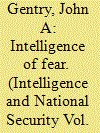

|
|
|
|
|
| Summary/Abstract |
Intelligence agencies long have brought unwelcome news to civilian political and military masters – and sometimes suffered severely for it. Even in Western democracies, insecurities and outright fear produce behavioral responses by individuals and defensive institutional reactions that distort normal intelligence activities and affect the overall performance of intelligence agencies. Causes of fear include: political leaders, overseers, agency managers, and the security elements of their organizations. This article highlights the importance of institutional factors, especially organizational cultures and incentives, on the activities and overall performance of intelligence agencies and suggests that motivated biases, caused by personal and organizational self-interest and fears, are more significant causes of intelligence failures than are commonly believed.
|
|
|
|
|
|
|
|
|
|
|
|
|
|
|
|
| 12 |
ID:
155380
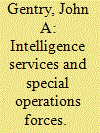

|
|
|
|
|
| Summary/Abstract |
Special operations forces (SOF) typically are small, relatively light-armed forces that rely on both their skills, and the stealth and surprise generated largely through intelligence support, to conduct strategically important missions that are often covert or clandestine. The SOF often rely heavily on national civilian as well as military intelligence agencies. Their use in sensitive operations typically requires senior-level political confidence in SOF and a domestic political climate that accepts special operations as legitimate instruments of national policy.1 Colin S. Gray, “Handfuls of Heroes on Desperate Ventures: When do Special Operations Succeed?” Parameters, Vol. 29, No. 1, Spring 1999, pp. 2–24.
[Google Scholar]
The major intelligence services also conduct “covert action” missions—plausibly deniable activities authorized by national political leaders—for strategically important reasons when other policy options are unavailable or unattractive. These activities occasionally involve the use of force by capable, specialized armed forces that are component parts of the agencies.
|
|
|
|
|
|
|
|
|
|
|
|
|
|
|
|
| 13 |
ID:
143755


|
|
|
|
|
| Summary/Abstract |
The literature on intelligence analysis has a glaring hole: assessment of the management of analysts and their work. This gap is striking because managers influence all aspects of analysis and share responsibility with analysts for analytic successes and failures. While many managers ably recruit, train, mentor, and manage their analysts, they also are responsible for pathologies that negatively affect analysis and are often incorrectly attributed to analysts. Accurate understanding of the roles and influence of managers should change scholars’ views of the processes of analysis and better balance attention on analysts and managers.
|
|
|
|
|
|
|
|
|
|
|
|
|
|
|
|
| 14 |
ID:
163081
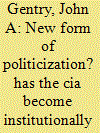

|
|
|
| 15 |
ID:
175594


|
|
|
| 16 |
ID:
076989


|
|
|
|
|
| Publication |
2006.
|
| Summary/Abstract |
Norms are fundamental constitutive elements of modern military power. Because norms influence military behavior and force structure, contemporary Western military power is produced only by interaction of normative and material factors. Two norms - the civilian casualty avoidance norm and Western societies' demand that their military forces take minimal casualties, or the force protection norm - more strongly influenced the origin, conduct, and outcome of nato's 1999 war against Yugoslavia than the material disparities of mismatched adversaries. Many actors, including the Yugoslav government and the Kosovo Liberation Army, notice the linkage of norms to Western military force structures and operational behavior and therefore strategically use norms instrumentally against states that adopt them. Such strategies generate technological and tactical responses, leading in turn to counter-responses - a dynamic interaction of material and normative factors that increasingly influence military operational outcomes
|
|
|
|
|
|
|
|
|
|
|
|
|
|
|
|
| 17 |
ID:
093510


|
|
|
| 18 |
ID:
146418
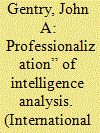

|
|
|
|
|
| Summary/Abstract |
In recent years, for the first time in the history of the U.S. Intelligence Community (IC), a debate among scholars and some practitioners has arisen about whether intelligence analysis is, or can be, a “profession”—and by what standards analytic professionalism should be defined and judged. The dominant academic view seems to be that analysis should be, but is not, a profession, defined in ways similar to those of such recognized professions as medicine and law. More recently, a version of such thinking has emerged in the Department of Defense (DoD), with the Office of the Undersecretary of Defense for Intelligence (USD(I)) mandating the development of certification and accreditation standards for personnel who perform all intelligence-related job categories in all military and civilian elements of the DoD, which the department calls the Defense Intelligence Enterprise (DIE).
|
|
|
|
|
|
|
|
|
|
|
|
|
|
|
|
| 19 |
ID:
167471
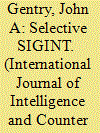

|
|
|
| 20 |
ID:
145237
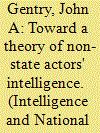

|
|
|
|
|
| Summary/Abstract |
The literature on intelligence contains many laments that scholars of intelligence have not developed widely accepted theories, or even definitions, of intelligence. This paper describes, compares, and modestly theorizes about intelligence-related activities of two variants of non-state actors – violent insurgent/terrorist groups and advocacy NGOs – focusing on their counterintelligence and covert action-like activities. These groups operate in some ways similarly to, and in other ways dramatically different from, states' intelligence services. This comparative analysis extends the scope of intelligence studies and offers suggestions for additional research.
|
|
|
|
|
|
|
|
|
|
|
|
|
|
|
|
|
|
|
|
|